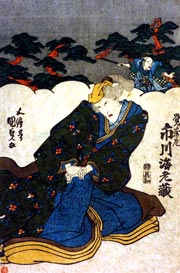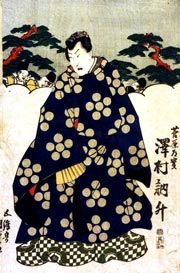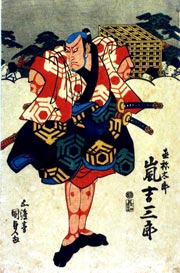| DÔMYÔJI |
| Play title | Sugawara Denju Tenarai Kagami |
| Authors | Takeda Izumo I Miyoshi Shôraku Namiki Senryû I Takeda Koizumo I (Takeda Izumo II) |
| History |
The play "Sugawara Denju Tenarai Kagami" was originally written for the puppet theater (Bunraku) and staged for the first time in the 8th lunar month of 1746 in Ôsaka at the Takemotoza. It was adapted for Kabuki the following month and staged for the first time in Kyôto at the Kitagawa no Shibai, produced by Nakamura Kiyosaburô I [casting]. It was also performed for the first time in Edo, at the Ichimuraza, in the 3rd lunar month of 1747 [casting]. This great play is based on the life of Sugawara no Michizane (845~903), a renowned scholar who was promoted up to the prestigious rank of udaijin ("Right Minister", one of the 2 close advisors of the Emperor). Falsely accused by Fujiwara no Shihei, the "Left Minister" (sadaijin), of trying to hatch a plot with Prince Tokiyo to seize the power, Sugawara no Michizane was exiled to Kyûshû. He dedicated his last years in writing poems, expressing both his homesickness and his innocence. After his death, the Emperor's residence was often struck by lightning and people thought it was done by the vengeful spirit of Sugawara no Michizane. A shrine was built in Kyôto to appease the spirit, the Kitano Tenmangû, and Sugawara no Michizane was revered as a the God of calligraphy. In the play Sugawara no Michizane is called Kan Shôjô. "At the time when the authors were working on the play, a great stir was caused in Ôsaka by the birth of triplets. It was therefore decided to make use of triplets in the new production and thus it was that Matsuômaru, Umeômaru and Sakuramaru came into being. For the purpose of the story, the triplets are the sons of Sugawara's retainer, Shiratayû. When they were born, Sugawara stood sponsor to all three and named them after the trees he loved best, Matsu (Pine), Ume (Plum) and Sakura (Cherry). On their father's retirement, Umeômaru took his place as Sugawara's personal retainer. At the same time his two others brothers were found equally worthy employment, one as the retainer of Prince Tokiyo and the other in the household of Sugawara's colleague, Fujiwara no Shihei. When Shihei's jealousy brought about Sugawara's downfall, the triplets became the victims of divided loyalties" (Aubrey and Giovanna Halford in "The Kabuki Handbook"). |
| Structure | The "Dômyôji" act is the third and final scene of the second act in the original structure of "Sugawara Denju Tenarai Kagami". It is usually staged as part of a tôshi kyôgen production. |
| Key words |
Daigo Tennô Fujiwara Tokihira Gidayû Kyôgen Giri/Ninjô Hangandai Heian Jidai Jidaimono Kan Shôjô Ôchômono Ôdaimono Sugawara Michizane |
| Summary |
On his way to Kyûshû, Kan Shôjô temporarily stays at the house of Kakuju, his aunt and Kariya's real mother. Kariya also comes to this house, being escorted by her elder sister, Tatsuta-no-Mae, whom she has accidentally met on the street. She has, however, not yet met Kan Shôjô and is waiting for an opportunity to apologize to him for Kan Shôjô's tragedy. When Tatsuta-no-Mae is talking with Kariya, her husband, Sukune Tarô comes to tell her that he is going to make arrangements for Kan Shôjô to leave the house for Kyûshû the following morning at cockcrow. Kakuju now enters and shows herself to be furiously angry at Kariya for her part in the trouble which has befallen them all. The poor girl can offer no defense to the upbraiding nor protect herself when the old lady beats her with a stick. Tatsuta-no-Mae tries to intervene but is beaten herself for her pains. Suddenly Kan Shôjô is heard from another room telling Kakuju to stop. Kariya, surprised at the sound of his voice, turns as he says that he wants to see Kariya before he leaves. Kakuju begins to cry at Kan Shôjô's unspoken rebuke at her harsh treatment of her daughters and explains with tears that she punished Kariya only to spare Kan Shôjô the painful task which otherwise he might have felt obliged to undertake. Together with her two daughters Kakuju opens the panels leading to the room from which he has spoken but Kariya and Tatsuta-no-Mae are astonished to find revealed only a wooden statue of Kan Shôjô. Kariya takes this as a sign that Kan Shôjô does not, in fact, intend ever to pardon her and breaks into tears. But Kakuju tells her that the statue was carved by Kan Shôjô himself as his parting gift so that Kariya may feel him always with her. Tarô comes back, accompanied by his father, Haji no Hyôe. Hyôe asks Kakuju for permission to stay in the house overnight so that he can see Kan Shôjô off in the morning. Unknown to Tatsuta-no-Mae and Kakuju, Tarô and Hyôe are secretly in the pay of Shihei. As the shadows of evening close around them they talk in the garden about their plans to murder Kan Shôjô. Instead of the official escort which will call at cockcrow the following morning to take Kan Shôjô to exile, they will substitute an escort of their own men who will take Kan Shôjô instead to another place where he will be killed. So that Kan Shôjô may leave unsuspectingly, Hyôe plans to make one of his own cocks crow early and so give the agreed signal for the start of the journey before the real escort arrives. Tatsuta-no-Mae overhears their plot with horror and comes out to beg them to abandon their treachery. They appeared to listen to her words but as she turns to leave, Tarô, at a signal from Hyôe, tears a strip of cloth from his sleeve, gags his wife and then stabs her to death. They then throw her body into a pond in the garden and float a box containing a cock above the bottom where the body is. There is a belief that a cock placed above a dead body is induced to crow any time of the day. True to this belief, the cock crows. As soon as the cock crows Tarô calls in the false escort who appears with a palanquin Kan Shôjô comes out and is borne away, seen off by Kakuju and Tarô. Kakuju, who has searched for Tatsuta-no-Mae in vain, asks Tarô if he has seen her. Tarô feigns astonishment and orders maids and servants to look for her. Eventually her body is found at the bottom of the pond and it is discovered that she has been murdered. Tarô swears that he will track down the murderer but Kakuju sees through his protestations of grief and revenge when she recognizes that the gag in the dead woman's mouth is of the same cloth as Tarô's torn sleeve. By a pretext she obtains Tarô's sword from him and then mortally wounds him. Terukuni, a government official, arrives with the real escort but is surprised to be informed that Kan Shôjô has already left. He accuses Kakuju of deliberately allowing Kan Shôjô to escape but the old lady convinces him that the murder of her daughter Tatsuta-no-Mae seems to be connected with what is now seen to be the abduction of Kan Shôjô. Terukuni is persuaded of her sincerity and is about to set out in pursuit of the false escort when Kan Shôjô's voice is heard from inside the house. The astonishment of Kakuju and Terukuni is doubled when the false escort returns, saying that they have found in their palanquin not Kan Shôjô but the wooden statue that Kan Shôjô had left behind for Kariya. As Kan Shôjô begins to leave with Terukuni, Kakuju comes with a large basket covered with one of Kariya's robes, which she begs him to take with him. Kan Shôjô, fully understanding that Kariya is hidden in the basket, tells Kakuju in ambiguous phrases Chat she must keep the dress to replace one which she has lost, meaning that she must live with Kariya as a substitute for Tatsuta-no-Mae. Kariya reveals herself and Kan Shôjô, barely able to contain his emotion, parts from her for the last time. Source: Hironaga Shûzaburô |
| Trivia |
Sugawara no Michizane being deified as the God of Calligraphy, the actor playing the role of Kan Shôjô has to follow a very strict set of religious observances during the month of the production. One of the rules is clear: no party for one month! |
 |
 |
 |
|
The actors Ichikawa Ebizô V, Sawamura Tosshô I and Arashi Kichisaburô III playing the roles of Kakuju, Kan Shôjô and Sukune Tarô in the "Dômyôji" scene of the drama "Sugawara Denju Tenarai Kagami", which was staged in the 9th lunar month of 1840 at the Nakamuraza (print made by Utagawa Kunisada I) |
||
|
|
| Contact | Main | Top | Updates | Actors | Plays | Playwrights | Programs | Links | FAQ | Glossary | Chronology | Illustrations | Prints | Characters | Derivatives | Theaters | Coming soon | News |